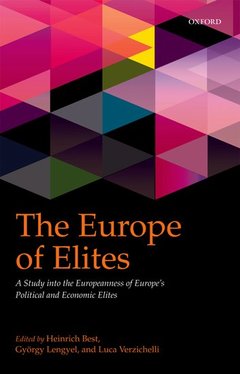The Europe of Elites A Study into the Europeanness of Europe's Political and Economic Elites IntUne Series
Langue : Anglais
Coordonnateurs : Best Heinrich, Lengyel György, Verzichelli Luca

This is an open access title available under the terms of a CC BY-NC-ND 3.0 International licence. It is free to read at Oxford Scholarship Online and offered as a free PDF download from OUP and selected open access locations. It has been widely acknowledged that the process of European integration and unification was started and is still pursued as an elite project, designed to put an end to debilitating conflicts and rivalries by consolidating a common power base and by pooling Europe's economic resources. Nevertheless elites have remained the known unknowns of the European integration process. The present volume is designed to change this. Based on surveys of political and economic elites in 18 European countries, it is a comprehensive study of the visions, fears, cognitions and values of members of national parliaments and top business leaders underlying their attitudes towards European integration. It also investigates political and economic elites' embeddedness in transnational networks and their ability to communicate in multicultural settings. The book strongly supports the view of an elitist character of the process of European integration on the one hand, while challenging the idea that European national elites have merged or are even merging into a coherent Eurelite on the other. As the 11 chapters of this book show the process of European integration is much more colourful and even contradictory than concepts of a straight forward normative and structural integration suggest. In particular this process is deeply rooted in, and conditional on, the social and political settings in national contexts. The empirical basis for this book is provided by the data of the international IntUne project, which has for the first time created a comprehensive database combining coordinated surveys of Europe-related attitudes at the elite and general population level.
1. European Integration as an Elite Project: An Introduction. 2. Europe a la Carte? European Citizenship and its Dimensions from the Perspective of National Elites. 3. Ready to Run Europe? Perspectives of a Supranational Career Among EU National Elites. 4. National Elites' Preferences on the Europeanization of Policy-Making. 5. The Other Side of European Identity: Elite Perceptions of Threats to a Cohesive Europe. 6. Elites' Views on European Institutions: National Experiences Sifted Through Ideological Orientations. 7. Patterns of Regional Diversity in Political Elite Attitudes. 8. The Elites-Masses Gap in European Integration. 9. Party Elites and the Domestic Discourse on the EU. 10. Elite Foundations of European Integration: A Causal Analysis. 11. Elites of Europe and the Europe of Elites: A Conclusion. Appendix - Surveying Elites: Experiences from the IntUne Elite Survey. Bibliography. Index.
Heinrich Best is Co-Director of the multidisciplinary Collaborative Research Centre 'Social Development after Structural Change: Discontinuity, Tradition and the Emergence of New Structures' funded by the German Science Foundation and was Co-director of the Scientific Network 'European Political Elites in Comparison: The Long Road to Convergence' funded by the European Science foundation. His publications include 38 books or journal special issues and 138 journal and book contributions as author and editor. Most recent publications include: Democratic Elitism: New Theoretical and Comparative Perspectives, Brill, 2010, with John Higley; and Democratic Representation in Europe: Diversity, Change, and Convergence, with Maurizio Cotta (OUP, 2007). He is Professor of Sociology at the University of Jena, Germany. György Lengyel is Editor in Chief of Corvinus Journal of Sociology and Social Policy. He has conducted several research projects on European integration, elites, migration, entrepreneurship, and information technology. He is author and editor of 28 books and special issues and author of 90 articles. Among his recent publications is Hungary: Between Consolidated and Simulated Democracy, in: Heinrich Best-John Higley (eds.) 2010, Democratic Elitism: New Theoretical and Comparative Perspectives. Brill, Leiden-Boston, pp. 153-171. He is the head of the Sociology Doctoral School, Director of the Centre for Empirical Social Research, and Professor of Sociology at the Corvinus University of Budapest. Luca Verzichelli's research interests include parliamentary elites in Europe, political institutions, and budgetary processes. He has published in several journals, including European Journal of Political Research, Journal of Legislative Studies, Southern European Society and Politics. He is currently chief editor of the Rivista Italiana di Scienza Politica and Professor of Political Science at the University of Siena.
Date de parution : 03-2012
Ouvrage de 314 p.
15.9x23.6 cm
Thèmes de The Europe of Elites :
© 2024 LAVOISIER S.A.S.



